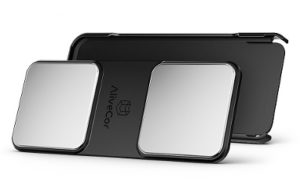
AliveCor, the leader in FDA-cleared personal ECG technology, have announced the results of four clinical research presentations that demonstrate that AliveCor’s hyper-fast, 30 second, digital ECG can positively impact and potentially even save the lives of millions of people around the world who have atrial fibrillation.
According to a press release, AliveCor uses advanced artificial intelligence, mobile, cloud, and micro-electrode technology to change the dynamic in cardiac care. Its Kardia Mobile enables patients and their care teams to easily, quickly, and inexpensively detect and manage possible atrial fibrillation.
Key Kardia Mobile-focused findings from the 2017 European Society of Cardiology (ESC) congress (26–30 August, Barcelona, Spain), include:
- Patients using Kardia Mobile had a 4X increase in AFib Detection. Julian Halcox (Swansea University Hospital, Wales) presented The REHEARSE-AF Study at the ESC congress with simultaneous publication in Circulation. This randomized study provided AliveCor Kardia units to 500 seniors, who used them to record two ECGs per week for a year and compared the results to 500 seniors who received conventional care from their general practitioner. At the end of the year, the Kardia group had a 4-fold increase in atrial fibrillation diagnosis compared to the control group, thereby enabling the initiation of potentially life-saving anticoagulant therapy.
- A Cleveland Clinic study shows Kardia Mobile atrial fibrillation detection accuracy similar to that of physicians. Khaldoun Tarakji from the Cleveland Clinic presented the iREAD Study which evaluated the accuracy of the AliveCor automatic atrial fibrillation algorithm versus expert cardiology over-read of both the Kardia recordings and 12-lead ECGs. Tarakji found that the Kardia algorithm in 52 patients had a 96.6% sensitivity and a 94% specificity compared to a cardiology over-read of the simultaneous 12-lead ECGs for the diagnosis of atrial fibrialltion. Additionally, over 93% of the patients found the Kardia to be easy to use and that it “lessened atrial fibrillaion-diagnosis anxiety”.
- Kardia Mobile is able to detect more patients with atrial fibrillation that were previously undiagnosed: Bryan Yan (The Chinese University of Hong Kong) presented research of over 12,000 patients 65 and older. He found that at each 30-second ECG using Kardia Mobile, his team was able to identify more and more patients with previously undiagnosed AFib. This result demonstrates the empirical value of convenient, inexpensive self-screening using Kardia Mobile.
- Patients find Kardia Mobile easy to use: Ngai Yin Chan (Princess Margaret Hospital in Hong Kong) presented the AFinder Study which used community volunteers to perform opportunistic screening for atrial fibrillation using AliveCor’s Kardia Mobile in over 10,000 Hong Kong citizens age 50 and older. 244 participants were found to have atrial fibrillation, with 74 of those previously undiagnosed. This study validates, that using Kardia Mobile, that volunteer senior citizens who were not medical professionals could perform medical screening of their peers with successful identification of a serious medical condition.
AliveCor chief executive officer Vic Gundotra says: “Over 35 million people around the world unknowingly suffer from atrial fibrillation. Atrial fibrillation is widely understood to be the leading predictor of stroke and heart failure. AliveCor’s app based digital ECG enables patients to conveniently and precisely detect atrial fibrillation and to deliver clinical grade ECGs to their health care providers.”












